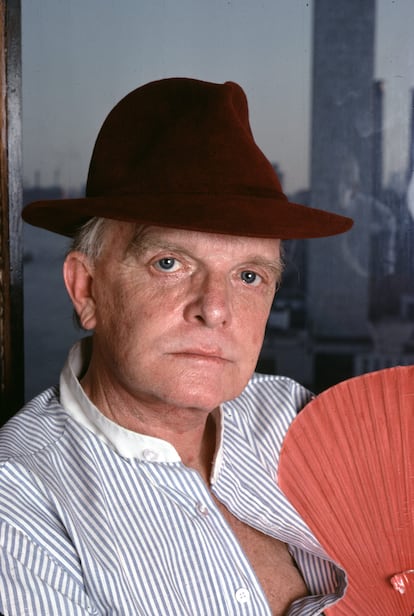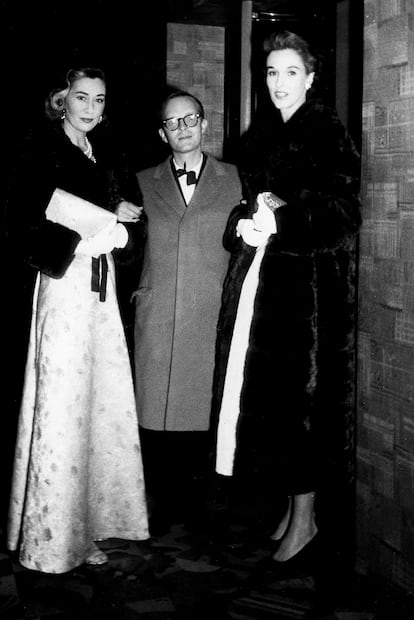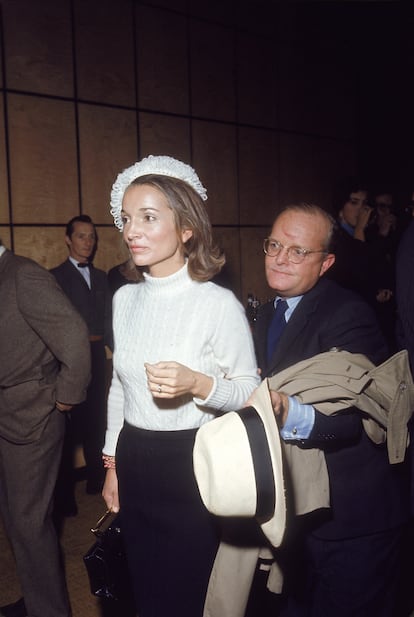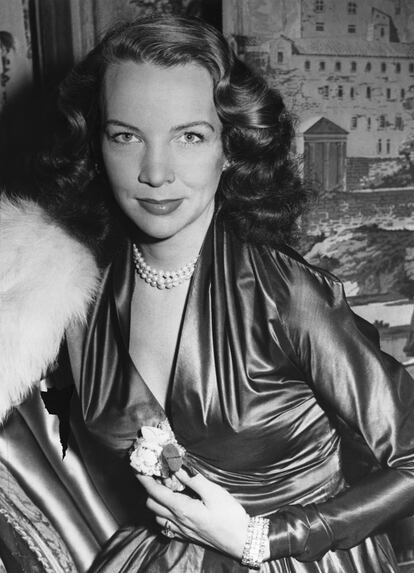From high-class ‘swans’ to seedy dives: Truman Capote’s spiral of self-destruction after betraying the jet set
Nearly 40 years after his death, the series ‘Feud: Capote vs. The Swans’ portrays the descent into drugs and alcohol into which the writer fell after doing the one thing that New York high society would never forgive him for: exposing their underbelly

The day of Truman Capote’s funeral, the iconic New York restaurant Mortimer’s witnessed the polarization of the two worlds of the author of essential works such as In Cold Blood or Breakfast at Tiffany’s: on one side of the establishment gathered his editors and his few remaining friends from high society (with which he lived his glory days and from which he had been cast out); on the other, the night creatures of Studio 54 and Warhol’s Factory, the crowd that surrounded him as he indulged in a spiral of self-destruction from his social decline until his death on August 25, 1984, one month before his 60th birthday.
Now that the 40th anniversary of his tragic loss is almost upon us, producer Ryan Murphy (American Horror Story, American Crime Story) and Gus Van Sant (directing six of the eight episodes) bring Feud: Capote vs. The Swans (Hulu) to the screen, a miniseries that portrays the writer’s betrayal of his “swans,” the New York high society ladies who adopted him as company, brought to life with a remarkable cast that includes Tom Hollander as Capote, as well as Naomi Watts, Diane Lane, Chloë Sevigny, Calista Flockhart and Demi Moore.
The first nail in Capote’s social coffin was the 1975 publication of a passage from the long-announced novel Answered Prayers, titled La Côte Basque, 1965, in Esquire magazine. The story, named after a splendid Fifth Avenue French restaurant where the jet set used to gather, unabashedly exposed the transgressions shared with him by his intimate circle: Babe Paley, Slim Keith, Gloria Vanderbilt, Lee Radziwill, Marella Agnelli and CZ Guest. His acidic revelations about substance abuse, assaults, hurtful remarks, infidelities, a murder and even a sexual encounter tainted by “[menstrual] stains the size of Brazil” were quite far from the fancy events for which they usually appeared in the society pages.


The bloody sheet episode, for example, featured a mistress and William S. Paley, president of the CBS media group and husband of the socialite Babe Paley (played by Naomi Watts), who elegantly tolerated her husband being a womanizer. Babe Paley had been a fashion editor at Vogue before shelving her career and devoting herself to the unofficial role of queen of New York: an impeccable pulchritude that was only threatened by La Côte Basque, 1965. She stopped talking to Capote forever. She died three years later from lung cancer, without ever forgiving him. Capote was never able to get past it: Paley had been his favorite swan, and he never forgave himself for not making up with her. Later, the writer explained Paley’s harshness with bitter lucidity in an interview with Playboy magazine: “In the long run, the rich run together, no matter what.”
There were other tragic episodes. Ann Woodward (played by Demi Moore) never got to read the story because she killed herself three days before its publication. Some say that she had received a copy in advance and that Woodward, a showbiz girl who made her fortune by marrying an old millionaire, took her own life when she learned that Capote, in his story, had unearthed the accidental death of that first husband: she mistook him for an intruder and killed him with a shotgun in their own home — something for which she was declared innocent at the time.
There is much more. Gloria Vanderbilt is presented like a vain fool who does not even recognize her first husband when he approaches her at lunch to greet her. Lee Radziwill (played by Calista Flockhart), Jackie Kennedy’s little sister, is the only one who did not stop talking to him, although she always kept her distance. The character inspired by Slim Keith (Diane Lane in the series) is depicted as a vulgar snob from the American West married to an English aristocrat who gossips about her friends to Capote’s alter ego, a literary con artist and a bisexual prostitute, while they dine in fancy restaurants. It is said that it was she who led the writer’s social veto. His friend and official biographer Gerald Clarke warned him: they are not going to like it at all. Everyone will know on whom the characters are based. “Nah, they’re too stupid,” was Capote’s reply.

But not only did the protagonists recognize themselves in the satire; so did everyone else. When the issue arrived on newsstands the author was in California, making his debut as an actor in the black comedy Murder by Death (1976). His big-screen demise — stabbed in the back — served as a graphic prediction of what awaited him back in New York. Overnight, he had become an outcast. The mechanism that moves the gears of high society moved like clockwork: invitations stopped arriving. His calls were not taken. If someone saw him at a restaurant, they changed tables.
“What did they expect?”
Capote had been developing what was to be his greatest work for more than 15 years; he had already announced Answered Prayers after the success of In Cold Blood (1966). For his novel, he accumulated countless notebooks with notes from all those gatherings of fabulous people in fabulous places. While he entertained that wealthy sphere with his incisiveness, he was also extracting all the information he needed. “What did they expect? I am a writer, and I use everything,” he would say in his defense.
With the swans, he was an advisor and confidant. In a society where homosexuality was still criminalized (in New York, for example, it was not decriminalized until 1980), Capote challenged the internalized homophobia of the husbands by transcending the classic role of the walker (one of the derogatory terms with which the effeminate friends who entertained the ladies were known). As journalist Louise Grunwald, the wife of Time editor-in-chief Henry Grunwald, told Vanity Fair: “Nobody came into their houses that the husbands didn’t approve of. In a way, Truman could be very seductive, and he was a good listener. He was sympathetic. He seduced both the men and the women.”

He told their wives what to wear, what to watch, what to read, what to pay attention to, who to ignore. He set a course in their agendas and gave a meaning to the boring days they spent surrounded by other rich people. Capote accompanied them on their lunches, their jets, their European yacht vacations. Meanwhile, he accumulated an even more valuable wealth than what they all possessed: their private stories. A fortune that led to his ruin overnight when they felt betrayed by his revelations — as well as terrified, thinking about what else the rest of the novel might reveal. The writer tried to defend and explain himself to Liz Smith, the lady of gossip, in New York magazine, by stating that he wanted to prove that gossip could be made into literature.
Short, affected and with a strident voice, the sophisticated character that he built as an adult was never able to completely overshadow the child who grew up feeling isolated and different in some remote Alabama town. He was haunted by the insecurity of being a poor boy from the miserable white neighborhoods of the southern United States. From his childhood, he claimed to remember only one friendship: with Harper Lee, who would also become a writer and who would honor him by basing one of the children in To Kill a Mockingbird on Capote. His biological father, Arch Persons, a businessman who made a living from running small scams, soon vanished from the scene. Raised by his loving aunts, he never got over his mother’s temporary abandonment during his childhood. Lillie Mae Faulk left to try her luck in New York, and he did not see her again until she remarried (Capote would take his stepfather’s last name). She would end up taking her own life at the age of 49 after going through various crises due to her alcoholism. In the series, her ghost is played by Jessica Lange. Capote’s mother was the direct inspiration for the gold-digging prostitute in Breakfast at Tiffany’s (1958), a character that had little to do with the glamour of Audrey Hepburn’s portrayal in the film version.
Used as he was to navigating between upscale lounges and the seediest dives, he found in Studio 54 the perfect refuge for his exile from high society. In full euphoria, he described it as “very democratic. Boys with boys, girls with girls, girls with boys, blacks and whites, capitalists and Marxists, Chinese and everything else — all one big mix.” In 1977, he confessed his alcoholism at a university lecture. He showed the seriousness of his situation on The Stanley Siegel Show, in 1978. “Where did you go last night?” the presenter asked. “Well, I haven’t been in bed for 48 hours. I don’t even know how I got here today,” he replied, rolling his eyes under his characteristic hat. Although he was removed from the set 17 minutes into the interview, he had time to declare that “eventually I’ll kill myself.” Truman had gone from applauded wit to a disturbing caricature.
A family man
Kate Harrington, his goddaughter and the daughter of John O’Shea — one of the boyfriends with whom Capote fared the worst — recounted how, at the age of 14, Capote took her to Richard Avedon’s studio for her first photo shoot as a model. Later, she would serve as his chaperone at Studio 54, although he always sent her home before things started getting out of hand. In the documentary The Capote Tapes, she reflects that, even though as a child he used to take care of her, at some point the tables turned and she ended up taking care of him. The author had a particular tendency to have long love affairs with married men and gain the affection of the rest of their families — including the wronged wives. O’Shea was a bank manager who had been married for 20 years and had four children; in the words of his friend Joe Petrocik, “just the kind of man Truman liked: a married, Irish, Catholic family man.”

An aspiring writer, after his first meeting in a sauna in 1973, he was dazzled by the alternative life that the little genius offered him. Their differences soon gave rise to a toxic relationship — in every sense, filled with all kinds of substances and verbal and physical attacks. He even broke Capote’s nose, as well as some teeth and a rib. They split up and got back together frequently. Along the way, the author sued him for stealing the manuscript of a chapter of Answered Prayers, and even hired a thug to intimidate him, who ended up setting O’Shea’s car on fire.
His tendency towards physical self-sabotage was a constant during his admissions and exits in hospitals and clinics. He pretended to swallow the pills he was prescribed, hid his own minibar, even rented luxurious limousines to escape in style a few days after entering the rehabilitation centers. As his lawyer, Alan Schwartz, would point out, Capote accumulated all kinds of ailments: polyps in the throat, prostate problems, painful tics, epilepsy, emphysema, liver diseases. All aggravated by his excesses with vodka, cocaine and barbiturates. His death came when he drank the least, when his turbulent party companions were gone and he was fighting phlebitis, an illness that scared him like no physical problem ever before.
With the corpse still warm, his archenemy Gore Vidal did not hold back, referring to his last breath as a smart turn in his career. The writer had won a lawsuit against Capote for defaming him in Playboy by telling the story of the night when Vidal had supposedly been kicked out of a dinner at the White House for getting drunk and insulting Jackie Kennedy’s mother. He demanded a public apology and $1 million in damages.
That exact amount, $1 million, is what Truman Capote would have received from Random House for the publication of Answered Prayers. The complete novel never saw the light of day (a compilation with the three chapters, presented as an unfinished novel, came out in 1987). The whereabouts of that literary testament that would bring about his downfall remains a mystery today. If there ever existed an actual manuscript (Capote wrote everything by hand) of that work that was “going to do to America what Proust did to France,” he managed to keep it hidden even from his biographer Gerald Clarke, his publisher Joe Fox and his attorney and executor Alan Schwartz. The three turned Capote’s apartment on the 22nd floor of the luxurious United Nations Plaza upside down, questioned all his possible accomplices and even forced his most faithful ex-boyfriend, the writer Joe Dunphy, to open the trunk of the Buick that in his last days he could not drive anymore. All to no avail. Many friends claim to have heard him recite passages over the years, although given his excellent memory and ability to improvise, many of these stories might have been nothing more than him fooling around.
The legend goes that, already sick, one morning he called the aunt who had raised him to confess that she had destroyed him. The day before his death, Capote handed a key to his most faithful friend, Joanne Carson (the second wife of talk show host Johnny Carson, played by Molly Ringwald in the series), in whose Bel Air house he had settled, already quite weak. He told her that it was from a safety deposit box in California where the manuscript was. No further details, no bank, no number. “The novel will be found when it wants to be found,” he stated, cryptically. Maybe its pages will rest in that cold darkness forever. A great final joke, worthy of his incomparable ingenuity.
Sign up for our weekly newsletter to get more English-language news coverage from EL PAÍS USA Edition
Tu suscripción se está usando en otro dispositivo
¿Quieres añadir otro usuario a tu suscripción?
Si continúas leyendo en este dispositivo, no se podrá leer en el otro.
FlechaTu suscripción se está usando en otro dispositivo y solo puedes acceder a EL PAÍS desde un dispositivo a la vez.
Si quieres compartir tu cuenta, cambia tu suscripción a la modalidad Premium, así podrás añadir otro usuario. Cada uno accederá con su propia cuenta de email, lo que os permitirá personalizar vuestra experiencia en EL PAÍS.
¿Tienes una suscripción de empresa? Accede aquí para contratar más cuentas.
En el caso de no saber quién está usando tu cuenta, te recomendamos cambiar tu contraseña aquí.
Si decides continuar compartiendo tu cuenta, este mensaje se mostrará en tu dispositivo y en el de la otra persona que está usando tu cuenta de forma indefinida, afectando a tu experiencia de lectura. Puedes consultar aquí los términos y condiciones de la suscripción digital.








































